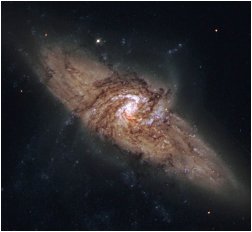(Clearwisdom.net) The recent discoveries in astronomy made many physicists start to rethink the origin of our universe. In the August 14 issue of Nature Journal, Leonard Susskind and his team from Stanford University think that the existence of our universe would require a miracle, or outside intervention or from "God".
Following is an article on Cosmoverse.com on Stanford team's work.
 This
image from NASA's Hubble Space Telescope and its Wide Field Planetary Camera
2 (WFPC2) shows the unique galaxy pair called NGC 3314. Through an
extraordinary chance alignment, a face-on spiral galaxy lies precisely in
front of another larger spiral. This line-up provides us with the rare
chance to visualize dark material within the front galaxy, seen only because
it is silhouetted against the object behind it. This
image from NASA's Hubble Space Telescope and its Wide Field Planetary Camera
2 (WFPC2) shows the unique galaxy pair called NGC 3314. Through an
extraordinary chance alignment, a face-on spiral galaxy lies precisely in
front of another larger spiral. This line-up provides us with the rare
chance to visualize dark material within the front galaxy, seen only because
it is silhouetted against the object behind it. |
Is Our Universe Too Perfect to be Random?
It's a question as big as the Cosmos itself: could the prevailing theoretical view of the universe be flawed? In order for the cosmos -- as we currently understand it -- to exist, it would have required outside help. In other words, it would have required a miracle to create our view of the universe, or outside intervention from "God".
If the universe is ever-more-rapidly expanding as we believe it to be, then it is destined to eventually repeat itself. According to a recent report in the journal Nature, that's the view of Leonard Susskind and his team from Stanford University, California.
What are the chances that such an event would produce worlds like ours? Extremely small, they say, somewhere between the proverbial "slim to none".
Therefore, one of two things must be true: either space is not accelerating for the reasons we believe it is, or some yet-undiscovered principle of physics is at work, say the researchers. This principle would have to be able to pick out those few initial states that lead to the creation of a Universe such as ours, and then guide cosmic evolution so that it doesn't happen that way.
Susskind's team, with all its collective scientific research and thinking skills, agrees that it almost seems as if something else is influencing what happened at the creation of our Universe. An "unknown agent", if you will, that intervened in the creation of our Universe for reasons yet unknown.
Before all you Creationists start jumping for joy, sit back down a minute. There's a flaw in your theory. The problem stems from the observation in 1998 that the Universe's expansion seems to be speeding up. The most popular explanation for that happening is that there's a cosmological constant-a repulsive force that opposes gravity.
If what we believe now holds true, other galaxies will eventually disappear as they zoom away from us faster than the speed of light. Once that happens, nothing that occurs in those parts of the galaxy can affect our world. The planets will become separate entities, each isolated behind a boundary called a de Sitter horizon.
That means that the Universe will fragment into a virtual foam of bubbles, each separated by a de Sitter horizon, in effect creating a de Sitter space. Each of the bubbles, isolated from the others, would eventually settle into what the researchers call "a bland, lifeless uniformity". Once that happens, our history effectively ends. We think.
Thermodynamics would argue otherwise, say Susskind and his colleagues. If you wait long enough, everything that can happen-will happen. With infinite patience, they say, a drop of ink dispersed into a glass of water will eventually gather its molecules back into a single drop. Okay, you'd have to wait an absurdly long time, but theoretically it could happen.
It's equally possible that a Universe that is driven to become a de Sitter space by a cosmological constant will, after an absurdly long time, return to something resembling its original condition. At that point, a new cosmic history would be born and begin to unfold-including the appearance of life and everything we believe came after that. What are the chances that a cosmic recurrence such as the one we've described here will actually happen? They're beyond "extremely slim".
Cosmologists have a response to that. It's called the anthropic principle. That says that regardless of how unlikely the Universe seems, the very fact that we are here to wonder about its origins and ask such questions resolves the paradox. If things were otherwise, they argue, then life wouldn't exist and the questions could never be raised.
The research done by Susskind's team shows that the anthropic principle won't help here, because a vast number of Universes would allow life that might look very different from the one in which we now live. All of the habitable Universes would result from "miraculous" statistical events.
Even if "something" did set the peculiar conditions of our universe, those conditions would only apply to that one occurrence. Future occurrences would produce a very different result. If that is true, then the only conclusion we could reach would be that we are in the first unfolding of this carefully crafted Universe. This seems too much like "special pleading", according to the researchers, who spoke with Nature.
So, in the end, is there no cosmological constant after all? Or could we be missing something fundamental?
Additional article on this subject:
Is physics watching over us? Our Universe is so unlikely that we must be missing something.
( http://www.nature.com/nsu/020812/020812-2.html)





